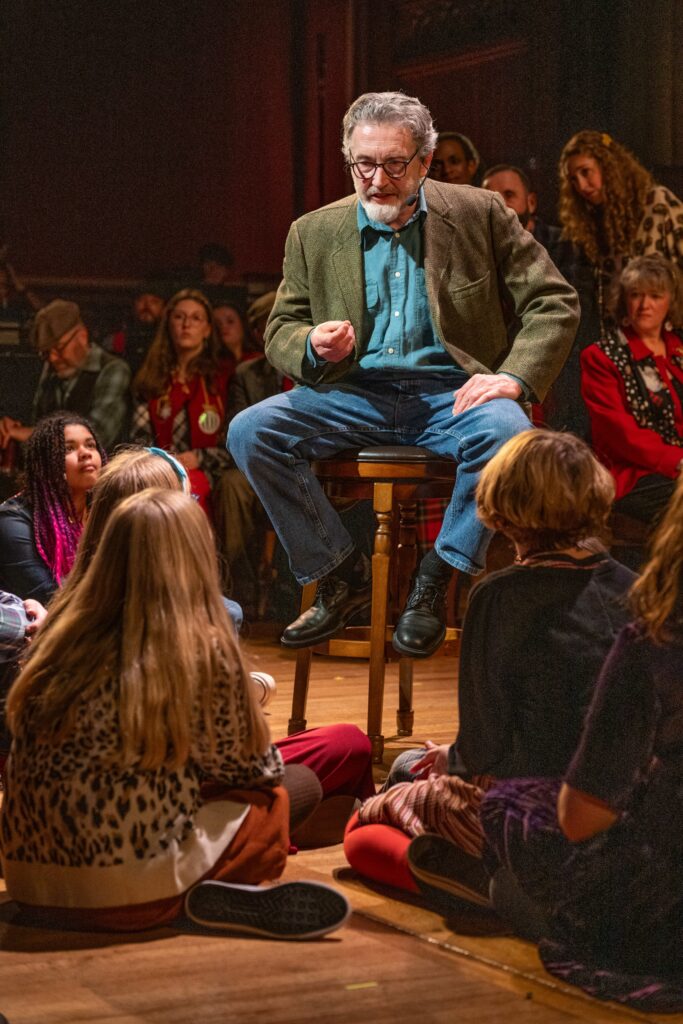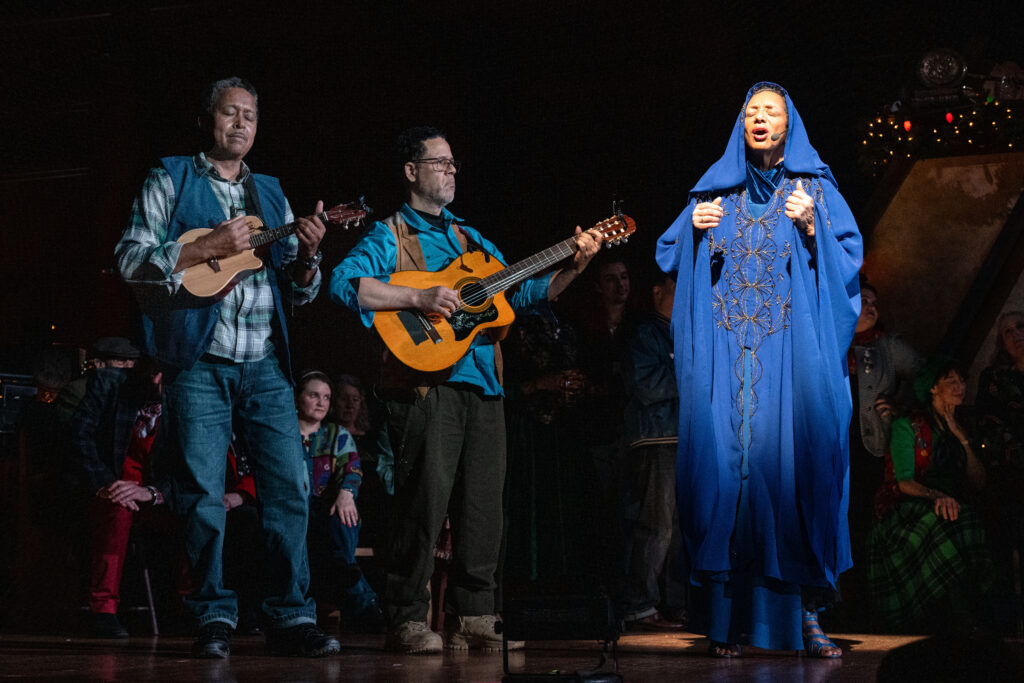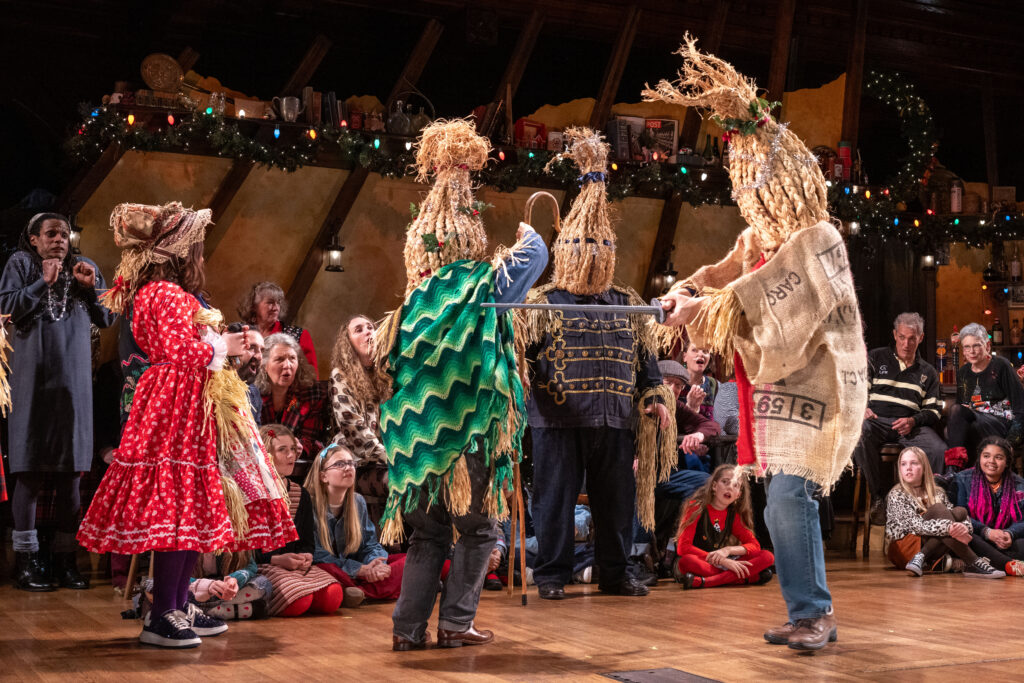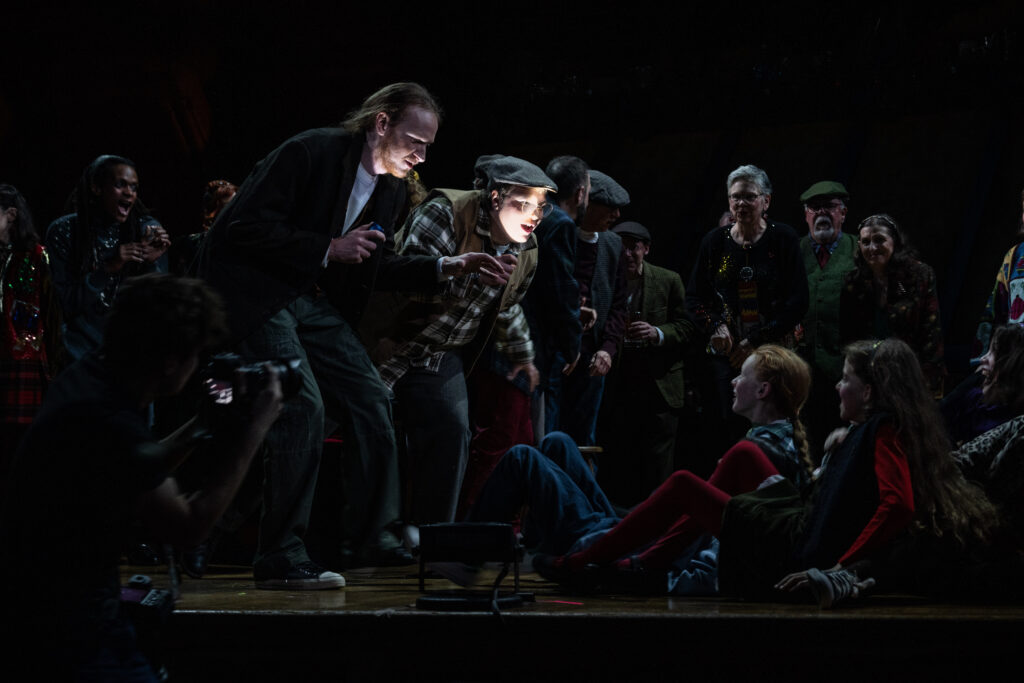The Arts Fuse REVIEW: This Year’s “Midwinter Revels” — A Mirror of the Times
Announcements
12.23.2024
Celebrate the season of love with Revels FRINGE at Club Passim, featuring Sophie Michaux and Adam Simon!
Buy TicketsAnnouncements
12.23.2024
By David Greenham for The Arts Fuse. Updated December 23, 2024.
Once again, Revels has pulled together a varied and diverse cast of amateurs and professionals to amplify a valuable lesson: it’s important to stop and take stock of our lives during the longest night of the year and to have faith that a new year will bring renewal and growth.

Midwinter Revels: The Selkie Girl and the Seal Woman, written collaboratively by Debra Wise, Patrick Swanson, Aidan Parkinson, and Nicole Galland. Adapted from Emerald Odyssey, created by Portland Revels, Bruce Akpan Hostetler, Artistic Director.
Stage direction by Debra Wise, music direction by Elijah Botkin, children’s music direction by Sarah Higginbotham, choreography by Jackie O’Riley and Neusa Barros Araújo, set design by Jeremy C. Barnett, costume design by Heidi Hermiller, lighting design by Jeff Adelberg, sound design by Bill Winn. Senior Artistic Advisor, Patrick Swanson. Tradition Bearers: Candida Rose Baptista, Aidan Parkinson, Aminah Pilgrim. Produced by Revels, Inc. Performed at Sanders Theatre, Harvard University, Cambridge through December 28. Available virtually from December 28 through January 12.
During the overture to this year’s Midwinter Revels, veteran lighting designer Jeff Adelberg has crafted a picture that not only sets a effective tone for the 2024 entry into the legacy of the beloved Revels, but shows off the beauty and majesty of the historic Sanders Theatre at Harvard University. It just might be one of the loveliest sights you’ll see this winter.
Like the venerable Revels itself, there’s no doubt that people take the Sanders Theatre for granted. The 1,000-seat lecture hall is inspired by a Christopher Wren design, and hosted Harvard commencements for many years beginning in 1876. Today the venue hosts a wide variety of music and special events. The space is a perfect setting for the cozy Revels. Hosted by charismatic song-leader David Coffin, the production concept divides the audience into two parts: old friends, and new guests who are destined to become old friends.
Drawing on the traditions of Western Europe and Scandinavia, along with elements from pre-Christian pagan ritual, the Revels include sing-alongs of such tunes as Deck the Hall, Lord of the Dance, Silent Night, Dona Nobis Pacem, the Sussex Mummers’ Carol, some Morris Dancing, and a Mummers’ Play.
The 2024 version is set in the fictional Irish coastal village of Bailemian, which translates as ‘town of longing.’ Departing from the Revels’ historic roots, the current edition is set in December of 1999, a year after the Good Friday Agreement which brought a peace to the decades of Irish/English conflict known as “the troubles.”
The production also celebrates the 25th anniversary of the West African island country of Cabo Verde, which gained its independence from Portugal in 1975.
In addition to song-leader Coffin, other cast members include Mary Casey, who plays Siobhan, the owner of the pub that serves as the setting for the show. Aidan Parkinson plays a curmudgeonly poet who has stopped in the pub for some quiet drinking and reflection. Instead, he finds that he has stumbled into a community celebration of the solstice animated by a few dozen neighbors. Mother and son Maritza and Amilcar (Kortney Adams and Cedric Appolon) are new to town. Maritza is a marine biologist (she studies seals) who is visiting from the Woods Hole Oceanographic Institute (the mention of the organization inspired a wave of applause from the Boston audience).

A child enters looking for a package that may have been delivered for his mother, who comes from another coastal town – in Cabo Verde. Songs and dancing follow, leading to an evocation of the Irish Selkie myth, which centers on a male farmer who takes the skin of a seal woman. She is forced to stay on land with him and bear children. She lives there, sadly, until her skin is found, and she can return to the water. The Cabo version, told by Maritza, sung by Candida Rose Baptista, and performed by Althéna-Gwendolyn Baptiste, turns out to be a story of strength and perseverance. The message is that a woman can exist in each world – land and sea. Maritza serves as a filter, telling the old tales celebrating the strength of womanhood through a modern lens.
Along the way, the production spotlights Irish step dancing featuring Rebecca McGowan, Liz Hanley and Lindsay Straw (the latter providing some Irish treats), and Cape Verdean musicians Lourenco “Pelé” Fernandes and José Luís Spencer.
As usual, it’s the large chorus of community members — adults and kids — who carry the weight of depicting the supporting characters.
There are several highlights — mostly when the production really digs in and focuses on the task at hand. Act one includes a lovely moment of poetry and song with Im Long Mé Measaim (A Ship I Am), an Irish longing poem by Dónal O’Liatháin set to music by Peadar O’Riada, and sung by Mary Casey, Aidan Parkinson, and the chorus. The second act is the stronger of the two, presenting a few rousing production numbers featuring Cabo music, some delightful projections (or shadow puppets?), and colorful dance and puppets led by the charismatic Baptista, whose energy is infectious.
The musical standout of the evening is also its simplest. Cast members, and eventually the audience, sing a four-part harmony arrangement of “Silent Night”, with each verse sung in a different language. It’s a beautiful, moving experience.

Once again, the Revels has pulled together a varied and diverse cast of amateurs and professionals to amplify a valuable lesson: it’s important to stop and take stock of our lives during the longest night of the year and to have faith that a new year will bring renewal and growth. This is a message that never grows old, which is why Revels is still going decade after dedade.
However, like the world around us, Revels can’t help but reflect our contemporary fragmentation – a thorny conflict between maintaining the cherished traditions of the past and welcoming present day demands for inclusion. Propelling the tension is the knowledge – at least for some – that while our history might feel comfortable to us, it invariably excluded others.
In some ways, the 2024 version of the Revels demonstrates this modern conflict. It’s really two shows. There are the traditional elements that loyal followers can count on, and there are new elements – these days they often involve the voices of those whose stories have been neglected or left unheard, such as the culture of Cabo Verde. Rarely do these two strains assimilate into each other; they often co-exist, though there are times they clumsily intrude on each other.

The Revels are going through a change, and it is undoubtedly a challenging path. A transition is taking place, from beloved longtime artistic director Patrick Swanson to talented interim leader Debra Wise. The current approach seems to be one of strategic caution. It will be exciting to see where Revels goes in the future.
The fact is that, in some ways, Revels is a mirror of what’s going on in our country today. Change is happening and we’re trying to understand it. But what’s to come after this struggle is uncertain. Still, we can take some solace in the quest, which Revels undertakes with empathy, to find a healthy direction in these wayward times. Like Im Long Mé Measaim, the poem that ended the first act, we are a ship at sea.
In a translation I found, O’Liatháin writes:
I consider myself a ship,
Under load, under sail,
With no harbor ahead of me.
I am a book written
In a language from heaven
And there is no one who can understand it.
A lamp is lit inside a cupboard,
And every door
Is locked tightly.
Will I remain trapped
Like a ship in a bottle, letting the rest of my life
Slip away like a whisper?
As we emerge from the darkness of the longest night of the year — whether that’s this year, or the next four years — we should try to maintain hope that we can navigate our ship to safe harbor.
David Greenham is an arts and culture consultant, adjunct lecturer on Drama at the University of Maine at Augusta, and is the former executive director of the Maine Arts Commission. He can be found at https://davidgreenham.com/